We have ads and affiliate links sprinkled around like dog treats at a training session. As an Amazon Associate we earn from qualifying purchases. If you click and make a purchase, we earn a few kibbles to keep this dog park of a website running. So, thanks for tossing us a bone.
Do German Shepherds bond with one person? This question is best answered by understanding their inherent loyalty and devotion.
These dogs, renowned for their profound connections with their handlers, typically develop a strong bond with those who consistently offer them training, attention, and care.
German Shepherds, while being protective and loving towards all family members, often show a unique attachment to the individual who dedicates the most time to their training and daily care.
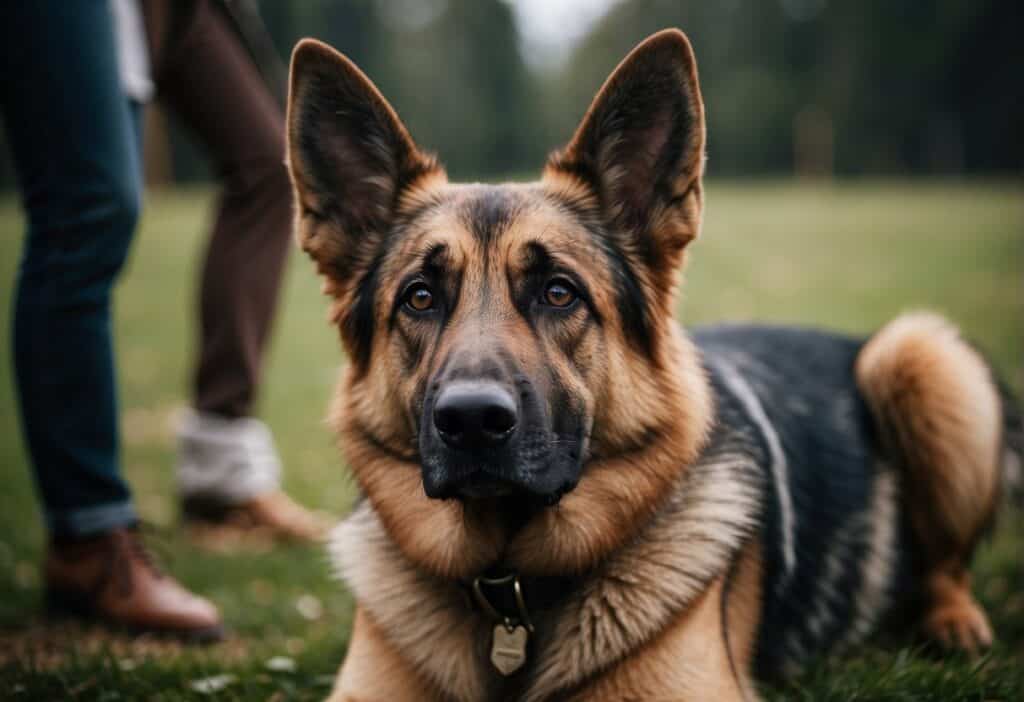
Do German Shepherds Bond with One Person?
The bond between you and a German Shepherd can be particularly strong due to their history as herding and service dogs, roles that require close collaboration with a human partner.
As you interact with a German Shepherd, you might notice that your consistent presence and involvement in activities like feeding, training, and exercise, can lead to a significant one-on-one bond.
Have a whiney GSD? Check out our post about why German Shepherds whine so much!
This breed’s dedication to their chosen person is often observed as a preference to stay close to their side, exhibit protectiveness, and show a heightened sense of loyalty.
However, the breed’s tendency to favor one person doesn’t mean they don’t appreciate or love the rest of the family.
It’s their capacity for deep connection that makes the German Shepherd stand out.
Your role in maintaining a stable and nurturing environment will influence the bond you create with a German Shepherd, allowing for a unique companionship tailored by the experiences you share together.
Understanding the German Shepherd Bond
When exploring the unique connection between you and your German Shepherd, it’s important to recognize their loyalty and protective instincts.
These qualities influence how they bond, particularly in regards to forming a deep trust with a single person.
Do German Shepherds Bond With One Person? A Look at Their Behavioral Traits
German Shepherds stand out for their remarkable intelligence and steadfast loyalty. These traits not only make them highly trainable but also reliable companions. Characterized by a blend of alertness and warmth, they exhibit a protective demeanor towards their family.
Key Traits that make German Shepherds Loyal to One Person:
- Loyalty and Protection: German Shepherds have an innate protective instinct, making them naturally watchful and alert. This instinct is often directed towards the person they bond with the most.
- Intelligence: Their high intelligence plays a crucial role in their ability to develop strong bonds. Through consistent training and social interaction, these dogs form deep connections, particularly with the person who engages most in their training and daily activities.
- Consistent Interaction and Mental Stimulation: These dogs need regular engagement and mental challenges. This includes training sessions, interactive games, and consistent social interactions. Such activities strengthen their bond with their primary caretaker or handler.
- Affection and Companionship: While they are protective, German Shepherds also show a lot of affection. They enjoy being close to their family and often form a special connection with one primary person.
- Adaptability and Training: Their ability to adapt to different situations and learn quickly makes them ideal for various roles. This adaptability also fosters a strong bond with their trainer or the main person in their life.
The combination of loyalty, intelligence, need for mental stimulation, and affectionate nature makes German Shepherds especially prone to bond closely with one person, often the one who is most involved in their training and daily care.
German Shepherds as One-Person Dogs
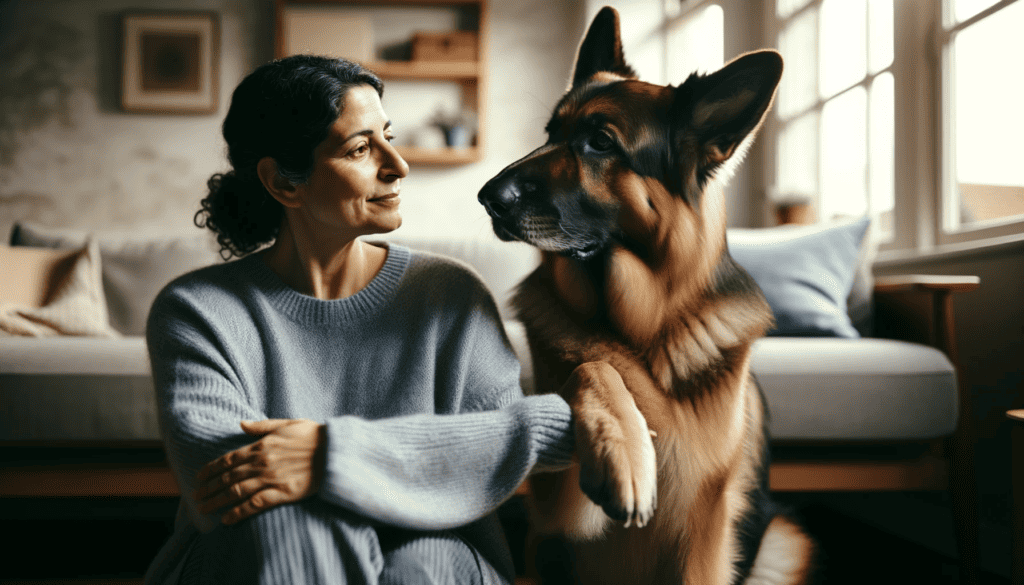
Understanding the Deep Trust and Bonding of German Shepherds
The nature of German Shepherds to bond with one person is rooted in their capacity for deep trust and loyalty.
These dogs are known not just for their intelligence, but also for their ability to form strong, trusting relationships with humans.
Selective Bonding Tendencies
- One-Person Dog Tendency: German Shepherds often show a natural inclination to choose and form an intense bond with a specific individual. This tendency is more pronounced in this breed compared to others.
- Perception of a Primary Caregiver: They usually gravitate towards the person who aligns with their energy levels and whom they perceive as their primary caregiver. This person is often the one who spends the most time providing them with training, exercise, and affection.
- Family Dynamics and Individual Attachment: While German Shepherds are affectionate and protective of all family members, they may display a particular attachment to one person. This is evident in their behavior, such as following that person around more than others, being more responsive to them, and seeking comfort from them specifically.
Do German Shepherds Bond with One Person? Observing Their Behavior
In your day-to-day life with a German Shepherd, you might notice their preference for shadowing one family member more closely than others. This behavior is a clear indication of their special bond with that individual.
However, it’s important to understand that this does not mean they do not care for or love other family members.
German Shepherds can balance their strong attachment to one person while still being a loving and protective member of the entire family.
This unique bonding ability of German Shepherds makes them extraordinary companions, especially for the person they choose as their main confidant and protector.
Their loyalty and devotion to this chosen individual are unmatched, showcasing their profound capacity for trust and affection.
Factors Influencing German Shepherd Attachment
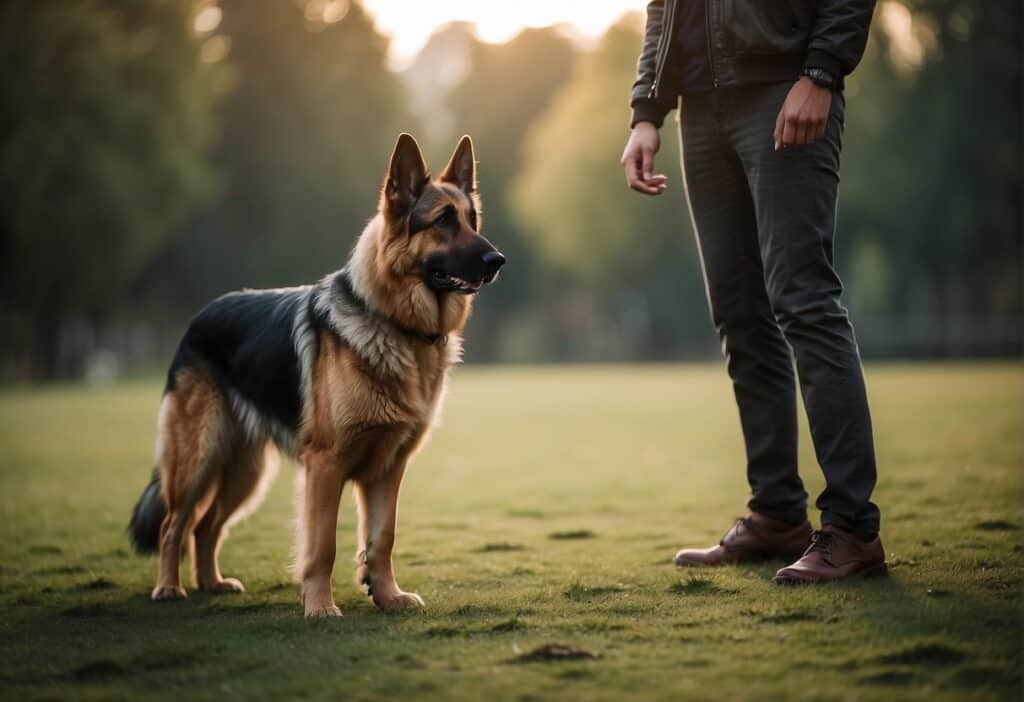
When exploring why German Shepherds bond with one person, consider the early experiences and training approaches that shape their loyalty and devotion.
Early Socialization and Bonding
German Shepherds experience a critical socialization period when they’re puppies, typically between 3 and 14 weeks of age.
During this time, positive interactions with a range of people, including family members and potential caregivers, help shape their social skills. Your consistent affection and care help solidify your role in your dog’s life as their trusted person.
Training and Obedience
Structured training plays a crucial role in reinforcing your bond with your German Shepherd. Commands and obedience training, when rooted in positive reinforcement, not only teach your dog crucial skills but also establish your role as the leader.
Your leadership is recognized through consistent training sessions that nurture their loyalty and focus towards one person.
Developing a Strong Bond With Your German Shepherd
Creating a deep connection with your German Shepherd hinges on dedicated quality time, establishing a routine, and mutual respect.
A well-bonded dog often shows a strong inclination to bond with one person who they perceive as their leader and main companion.
Quality Time and Shared Activities
Investing time in shared activities can significantly strengthen your bond. It’s essential to incorporate a mix of exercise, playtime, and agility training to keep your German Shepherd stimulated and happy.
- Daily Exercise: Aim for at least 30 minutes to 2 hours of physical activity. This can include walking, running, or playing fetch.
- Agility Training: Engage in agility courses to foster mental stimulation and improve communication.
- Consistent Playtime: Reserve time each day for play, which can range from tug-of-war to search and find games.
Do German Shepherds Bond with One Person? Communication and Mutual Respect
Effective communication is rooted in understanding and utilizing body language as well as verbal commands to foster eye contact and mutual respect.
- Body Language: Be mindful of your gestures and expressions as they convey messages to your German Shepherd.
- Consistent Commands: Use clear, consistent commands to build understanding between you and your dog.
- Eye Contact: Encourage gentle eye contact to enhance connection, but never force it as it may be perceived as a threat.
By focusing on these elements, you’ll form a robust, one-on-one bond with your German Shepherd, characterized by trust and a strong, mutual respect.
Signs of a German Shepherd Bonding with a Person
When your German Shepherd starts to display certain behaviors, it’s likely they’ve formed a strong bond with you. These can be evident through their protective instincts and the way they seek your affection.
Protective and Guarding Behaviors of German Shepherds
German Shepherds, renowned for their loyalty and protective instincts, show distinct behaviors towards the person they consider their favorite.
Once they recognize you as their primary attachment, you may notice several protective and guarding behaviors:
- Increased Alertness: Your German Shepherd will be particularly watchful in your presence, always alert to potential threats and unusual activities in the environment.
- Guarding Stance: They often position themselves strategically between you and strangers or other animals, signaling their role as your guardian.
- Vocal Alerts: German Shepherds may bark or growl to warn you of perceived dangers or to alert you to someone’s approach.
- Observant Following: They may follow you at a distance, keeping an eye on your surroundings and ensuring your safety without being intrusive.
- Checking Perimeters: Some German Shepherds will routinely check doors, windows, or the boundaries of your property, showcasing their natural guarding instincts.
Physical Affection and Comfort-Seeking Behaviors
Alongside their protective traits, German Shepherds express their bond through affectionate behaviors. They seek comfort in your presence in various ways:
- Leaning Against You: This behavior signifies both affection and trust. Your German Shepherd might lean against you to feel closer or as a comforting gesture.
- Following You Around: A German Shepherd that constantly follows you shows a deep attachment, wanting to ensure your safety and preferring your company.
- Nuzzling or Nudging: They might nuzzle or gently nudge you with their nose as a sign of affection and to get your attention.
- Seeking Physical Contact: Whether it’s lying at your feet, resting their head on your lap, or gentle pawing, these are signs of their desire for physical closeness and comfort.
- Eye Contact: Prolonged, gentle eye contact from your German Shepherd is a powerful sign of trust and affection, indicating a strong bond.
Each of these behaviors reflects the unique way in which German Shepherds express their attachment and loyalty to their favorite person, blending protective instincts with a deep need for affection and companionship.
Balancing Attachment With Social Behavior
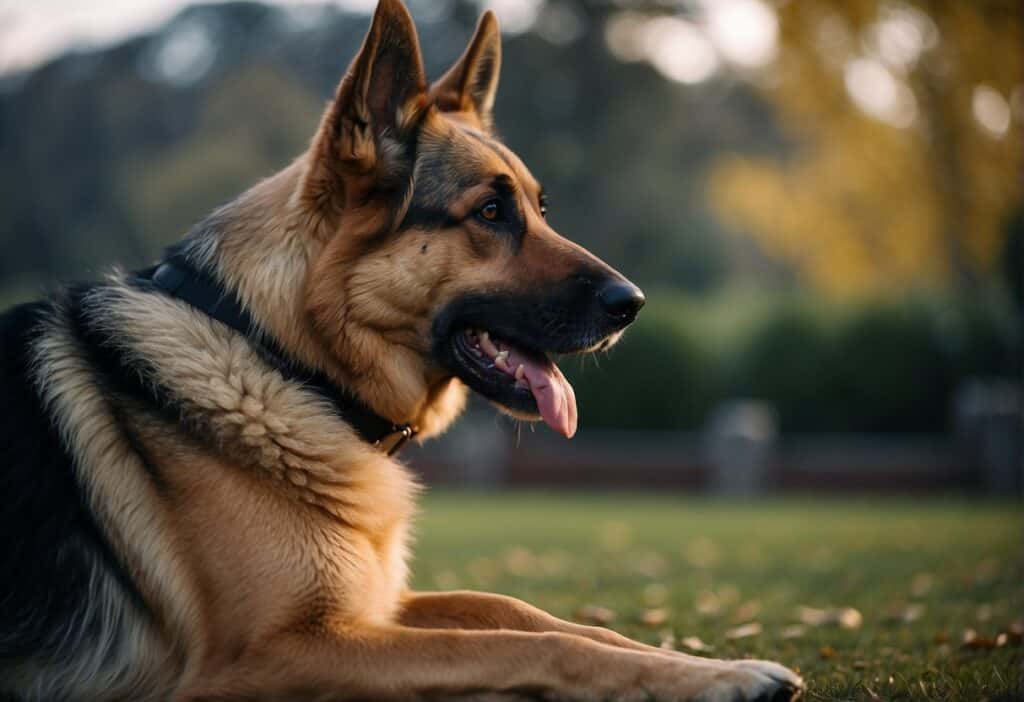
German Shepherds are known to form strong bonds with a primary caregiver, but it is also important for them to interact well with multiple people and maintain a harmonious environment.
By focusing on the right socialization practices, you can ensure your German Shepherd becomes a well-rounded family dog.
Encouraging Friendly Interactions
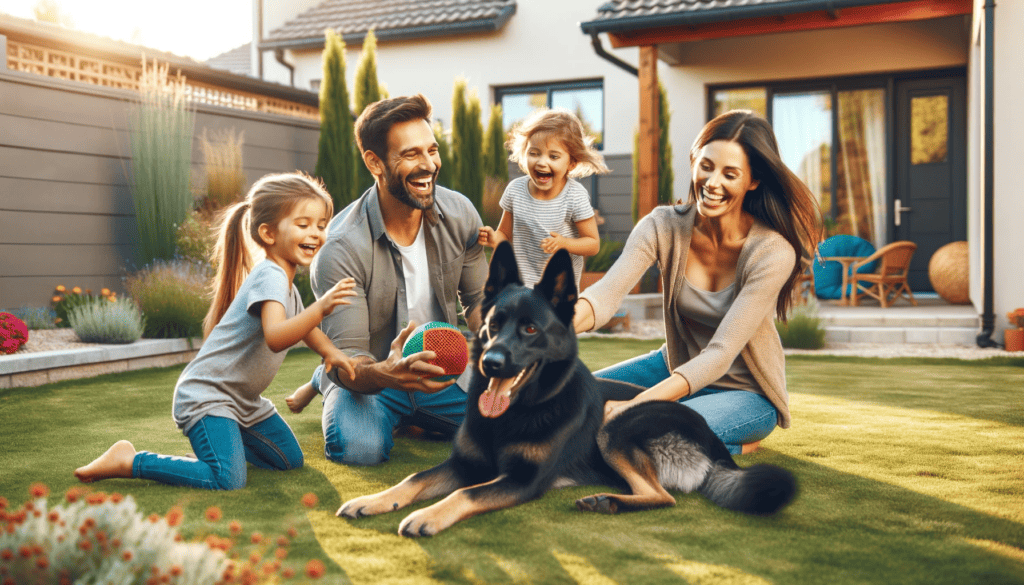
To promote friendly behavior in your German Shepherd towards all members of your family unit, follow these steps:
- Socialization: Begin socialization early to acquaint your dog with various people and settings. Take your dog to different environments where they can encounter new people.
- Family Involvement: Involve family members in training and care routines to build the dog’s comfort and trust with each person.
- Positive Greetings: Teach your dog a friendly greeting ritual to make interactions with guests more pleasant.
Managing Aloof or Selective Behaviors
Consistency is key when addressing tendencies of aloofness or selective obedience in your German Shepherd:
- Set Clear Boundaries: Establish and enforce rules consistently to avoid confusion and foster selective obedience toward all members of your household.
- Reward-Based Training: Utilize positive reinforcement to encourage desired social behaviors. Rewards can reinforce your dog’s willingness to interact with multiple people.
By engaging in these practices, you’re guiding your German Shepherd to balance their deep attachment with you and their social skills in a broader context.
Role of the Primary Caregiver
The primary caregiver plays an essential part in building a secure bond with a German Shepherd. Your consistency and commitment are critical in establishing yourself as the leader your dog learns to trust and respect.
Establishing Leadership and Trust
As the primary caregiver, it’s crucial to establish yourself as the leader from the start. Your German Shepherd is looking to you for cues on behavior and social structure. Consistency in your expectations and rules helps your dog understand their role in the family.
Key aspects of leadership include:
- Training sessions that are regular and predictable
- Clear, consistent commands and responses
- Positive reinforcement to reward good behavior
- Patience and calm assertiveness
A table illustrating basic leadership actions:
| Leadership Action | Purpose | Impact on Bond |
|---|---|---|
| Training Sessions | Establishes structure and rules | Strengthens trust |
| Consistent Commands | Provides clear communication | Enhances respect |
| Positive Reinforcement | Rewards and encourages behavior | Builds emotional connection |
By demonstrating leadership through these consistent actions, you create an environment of trust. Your German Shepherd learns to rely on and bond with you as their primary caregiver.
Routine Care and Emotional Connection
Routine care is more than just feeding and grooming; it’s an opportunity to strengthen your emotional connection. The daily care you provide, done with commitment and attention to detail, conveys your dedication to your dog’s well-being. Actions that matter include:
- Feeding: Consistent times and a balanced diet
- Grooming: Regular brushing and bonding time
- Exercise: Daily walks and playtime to keep them physically and mentally fit
Each of these routine activities not only helps your German Shepherd to stay healthy but also cements your role as their primary provider and companion. Through daily care, you communicate your love and build an emotional connection that can make them more likely to bond closely with you.
Beyond Single-Person Attachment
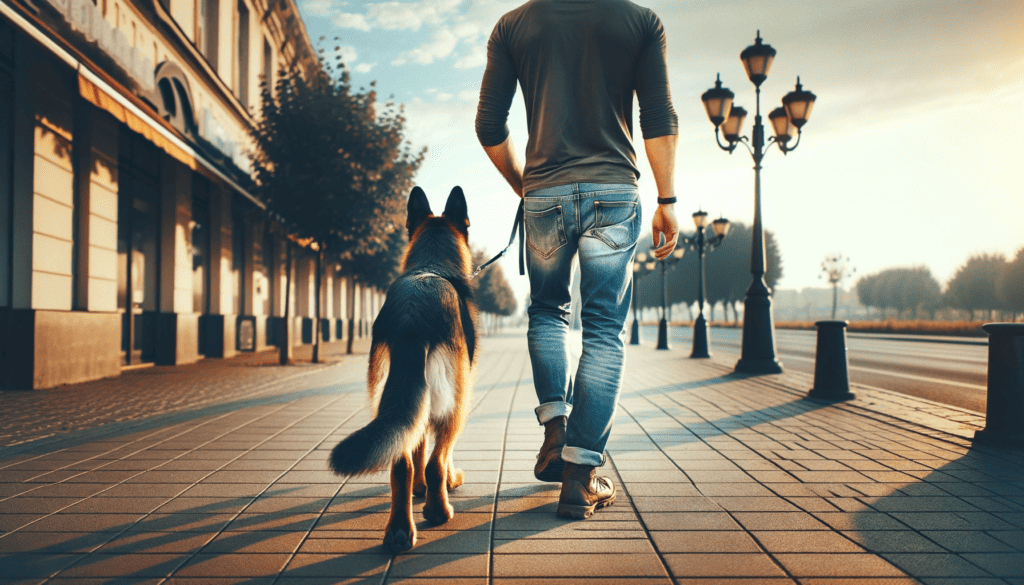

German Shepherds may form deep connections with one person, but they also possess the capacity to integrate well with the entire family. Understanding their socialization with multiple caregivers and family members can ensure a healthy group dynamic.
Integrating German Shepherds with the Family
Your German Shepherd can be more than a one-person dog; they’re naturally protective and attuned to group dynamics, which makes them excellent family dogs.
To foster bonding with every family member, it’s crucial to involve everyone in training, playtime, and care routines.
Consistency across all family members’ interactions with the dog aids in developing trust and a stable bond.
- Training: Engage all family members in training sessions using positive reinforcement.
- Playtime: Schedule playtime with various family members to enhance bonding.
- Care: Rotate responsibilities like feeding and grooming among family members.
Interaction With Multiple Caregivers
When it comes to caregivers, your German Shepherd will appreciate consistent care from multiple people. Expose them to various trusted individuals early on to promote adaptable social skills.
They can learn to trust and follow commands from numerous caregivers, which reinforces their versatile nature.
- Daily Routine: Establish a daily routine with your dog that includes interactions with different caregivers.
- Caregiving Tasks: Distribute caregiving tasks such as walking, feeding, and training among different caregivers.
Remember that your German Shepherd might show a preference for children or certain family members over time. However, with thoughtful socialization, they have the potential to become a beloved family dog, forming meaningful bonds with multiple family members and caregivers.
Final Answer to Do German Shepherds Bond with one Person?
When you become a pet parent to a German Shepherd, you’re inviting a loyal and loving addition to your family. These dogs are known for their capacity to form a deep bond with one primary caregiver.
However, this doesn’t mean they can’t be affectionate and obedient to all family members.
Key Points to Remember:
- German Shepherds are loyal: They often form a special connection with one person.
- Training and socialization: Help ensure a well-rounded relationship with all family members.
- Consistent interaction: Encourages your German Shepherd to remain trustworthy and sociable.
Remember, every dog has a unique personality. While one German Shepherd may show an intense favoritism towards you, another might be more of a family dog.
Your experience will be individual, but it will always be enriched by the unwavering companionship German Shepherds are known to provide.
